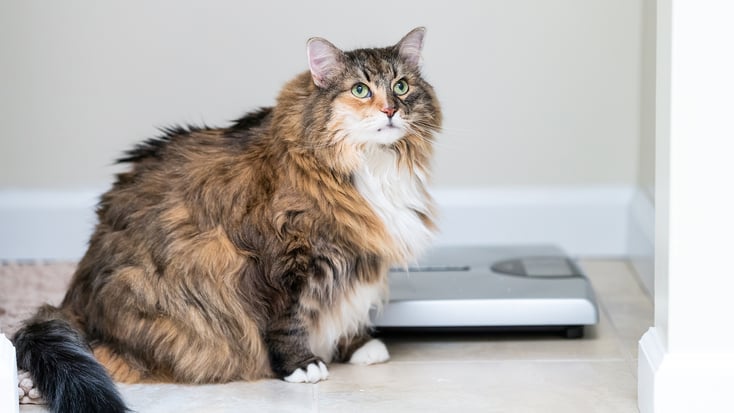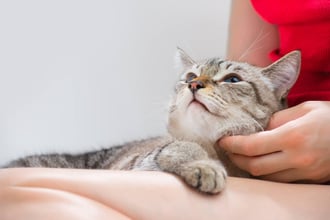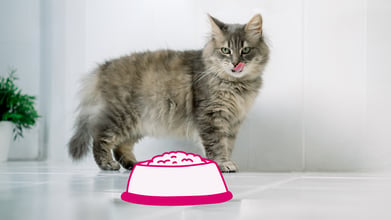Is My Cat Overweight? A Vet Weighs In

Table of Contents
Keeping track of the weight of your feline friend is one of the many practices to ensure they're healthy, as cats are prone to weight gain. As of 2018, the number of obese and overweight cats in the US was 33.8% and 25.7%, respectively.
Cats' weight impacts their overall health, as overweight cats face several health conditions. In this article, we'll look at everything you need to know about excess weight in your furry friend to help you ensure they maintain a healthy body condition.
Key Takeaways:
-
The ideal weight for a cat depends on age and breed, but a general guideline is around 10 pounds for most domestic cats.
-
Feline obesity poses health risks such as heart disease, hypertension, urinary tract infections, joint pain, reduced mobility, cancer, and diabetes.
-
Professional help, such as consulting a veterinarian, can provide further guidance and assessment for a cat's weight and overall health management.
What is Cat Obesity?
Obesity in cats increases the risk for the development of hypertension, diabetes, cancer, respiratory diseases, urinary tract infections, and even musculoskeletal injury. In most cases, it is the excess accessibility of food without adequate exercise that causes weight gain in your feline friend. Both spaying or neutering and age increase your cat's likelihood of gaining excess weight. However, unexplained weight gain can also be due to underlying health issues.
What is the ideal weight for cats?
The ideal weight for your feline friend depends on your cat's age and breed. However, a general rule of thumb for most domestic cats, like Siamese cats, is approximately 10 pounds. Bigger cats like Maine Coons can weigh as much as 25 pounds, while smaller breeds weigh just 5 pounds.
Feline Body Mass Index
The Feline Body Mass Index (FBMI) is a measurement used to assess your furry friend´s weight in relation to their size. To calculate your cat's FBMI, it is necessary to measure weight and leg length. The FBMI provides insight into whether your cat is underweight, within a healthy weight range, overweight, or obese. Consult your veterinarian to discuss your cat’s FBMI and the ideal weight for their age, size, and breed.
How to Tell if Your Cat is Overweight
What is considered overweight for a cat? Cats are considered to be overweight when they weigh more than 10% of their ideal weight and are considered to be obese when they weigh 20% or more than their ideal weight. You can use a digital scale to check your cat's weight and compare it to the ideal weight for their breed, gender, and age.
However, the weight alone is not an accurate assessment of whether your cat is overweight, so you want to evaluate their body condition and FMBI to confirm. Physical signs such as lack of waist definition, saggy underbelly, and inability to feel the ribs under your hands indicate that your cat is overweight.
Other telltale signs include a significant decrease in activity level, unwillingness to play, and difficulty grooming, which can lead to coat problems.
Assessing Your Cat’s Weight
The first step in evaluating your cat's weight is to determine if they are within a healthy range using the Feline Body Mass Index (FBMI) calculator. To do this, follow these steps:
1. Calculate your cat's current weight
Use your cat's most recent weight from their last veterinary visit, or weigh them at home using one of the following methods:
- Hold your cat while weighing yourself on a floor scale, then subtract your weight from the combined weight to obtain your cat’s weight
- Weigh your cat in a carrier on a floor scale, then subtract the weight of the carrier to get your cat's weight.
2. Take the PCL measurement
PCL stands for "Patella-Calcaneus Length," which is the length from the top of the patella (knee) to the end of the calcaneus (ankle). Follow these guidelines to obtain an accurate PCL measurement:
- Ensure your cat is standing with their head upright.
- Measure the length of your cat's lower back leg from the knee to the ankle.
Is My Cat Overweight?
Is My Cat Overweight?
1. Calculate your cat's current weight.
2. Take their PCL Measurement - a cat’s PCL is the length from the top of the patella (knee) to the end of the calcaneus (ankle). Make sure your cat is standing with their head upright and measure the length of your cat's lower back leg from the knee to the ankle.
3. Enter these two calculations below.
View Results
Your Cat’s BMI is
which means
Interpreting Your Results: What to Do if Your Cat is Underweight or Overweight
Keep in mind that our calculator is meant to serve as a general guide, and there could be a medical reason why your cat is either underweight or overweight. If your cat is not at an ideal weight, it is important to rule out a medical cause for this, so you should first check in with your veterinarian before making any changes.
Once your vet has determined that your cat’s non-ideal weight is not related to an underlying medical cause, you’ll want to work together to create a vet-approved nutrition plan. Your vet can make recommendations about the best foods for your cat, how much to feed them, and help to ensure that any nutrition changes will be healthy for them.
Share Quiz
For more precise results and interpretation, consult with your veterinarian, who can provide further guidance based on your cat's specific measurements and breed characteristics.
Health Risks & Consequences of Feline Obesity
Being overweight is one of the major health risks cats face, as it is a risk factor for many conditions. These include:
- Heart disease and hypertension
- Urinary tract infections, joint pain, and reduced mobility
- Some types of cancer
- Diabetes — studies show that excess weight in a cat's body relates to a decrease in insulin sensitivity
Overweight cats also reduce their general well-being as they cannot play due to discomfort from carrying excess weight. Also, their hair may get matted as they find grooming difficult.
How to Help Cats Lose Weight
An overweight cat is at greater risk for developing health problems, so it's important to help your cat lose weight if needed. Here are specific weight prevention and management steps you can implement if your cat is overweight or at higher risk of becoming overweight:
1. Understand your cat's nutritional needs
Cats come in different shapes and sizes, so a specific weight hardly serves as one size fits all. Therefore, you must understand their nutritional needs to help your pet lose weight gradually until they are within the ideal weight range for their age and breed. You can start by determining what ingredients to incorporate into or remove from their food.
2. Stop free feeding your cat
While free feeding is convenient and works for underweight cats or those who self-regulate, it contributes to cat weight gain. Instead, create a feeding schedule and feed them specialized food in rations specified for their age range and ideal weight.
3. Establish an exercise routine
One way to promote weight loss in cats is to exercise. You can install an indoor cat tree, purchase automated toys, or have at least two daily 15-minute sessions of play with them to aid the weight loss efforts for your furry friend. Also, you can make them work for their food by occasionally switching the position of their food tray and incorporating feeding toys
4. Reduce their treats
Treats should form as little as 10% of your cat's daily caloric need. So if you feed them a treat, you have to reduce the food they will have for the day. Be sure to read the food label of the cat food you buy to understand the calorie content.
Conclusion
If you're asking, "Is my cat overweight?" it's a good idea to check their weight on the scales, body condition, and FBMI. You can also seek professional help from BetterVet for an enhanced understanding of your cat's weight and overall health management.
Whether you're worried about the potential for an underlying health issue or want to check on their condition, you can schedule an in-home or virtual vet visit for a full assessment.
Frequently Asked Questions
Does an overweight body condition affect a cat's life expectancy?
Yes, overweight cats have a shorter lifespan than cats with an ideal weight.
How much should you feed overweight cats?
Your veterinary team will help you determine the right amount to feed your cat to encourage appropriate healthy weight loss. Typically, this involves feeding for the weight your cat needs to reach rather than the weight they are at now. However, rapid weight loss can be dangerous, so obese animals may need a slow, well-monitored diet plan. .
What is considered overweight for a cat?
If a cat exceeds their ideal weight by about 10–19%, they're considered overweight. Cats that weigh more than 20% of their ideal weight are considered obese.
Why is my cat overweight but not overeating?
This can be a result of underlying health conditions. Seek medical advice from your veterinarian to identify any issues.







